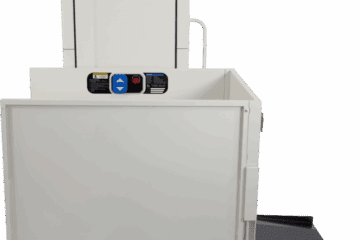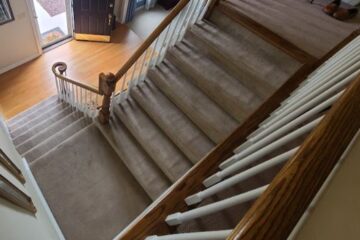A wheelchair ramp is a sloped surface or pathway designed to facilitate the movement of individuals who use wheelchairs, walkers, or other mobility aids. These ramps are essential accessibility features that provide an alternative to stairs or steps, allowing people with mobility challenges to access buildings, homes, vehicles, or outdoor areas. Wheelchair ramps come in various designs and materials to suit different needs and environments. Here are some key features and types of wheelchair ramps:
- Slope: Wheelchair ramps are sloped to make it easier for individuals using mobility devices to ascend or descend inclines. The slope is typically measured in terms of the rise (vertical height) over the run (horizontal length) and is usually expressed as a ratio (e.g., 1:12, 1:20), with the first number representing the rise and the second number representing the run.
- Width: Ramps must be wide enough to accommodate the width of a wheelchair or mobility device, typically ranging from 30 to 36 inches or more. A wider ramp allows for more comfortable maneuvering and can accommodate larger devices.
- Handrails: Many wheelchair ramps include handrails on one or both sides to provide support and stability to individuals using the ramp. Handrails can be especially important for individuals with limited upper body strength or balance.
- Surface Material: Ramps can be constructed from various materials, including wood, aluminum, concrete, or composite materials. The choice of material depends on factors like durability, weather resistance, and maintenance requirements.
- Landings: Wheelchair ramps often include flat landing areas at the top and bottom, as well as intermediate landings for longer ramps. These provide resting points and space for turning a wheelchair.
- Threshold Ramps: These are short, portable ramps designed to bridge small height differences, such as door thresholds or small curbs, to improve accessibility.
- Modular Ramps: Modular or portable wheelchair ramps consist of sections that can be assembled or disassembled easily. These ramps are suitable for temporary or semi-permanent use.
- Permanent Ramps: Permanent ramps are typically constructed on-site and are designed for long-term use. They can be customized to fit the specific requirements of a building or location.
- Foldable Ramps: Foldable or telescoping ramps are portable and can be extended or retracted as needed, making them convenient for travel or occasional use.
Wheelchair ramps are essential for ensuring accessibility in public buildings, private residences, and outdoor spaces. They play a crucial role in promoting independence and inclusivity for individuals with mobility challenges, allowing them to participate fully in daily activities and access various environments with ease. Proper design and construction of wheelchair ramps are essential to ensure safety and compliance with accessibility standards and regulations.
Power Stair Lifts is based in the Lehigh Valley and locally owned. We believe in price transparency. Not only do we provide our installation price and free one-year service warranty and three year parts warranty, but we will also disclose the cost of replacement batteries, preventative maintenance, annual service visit, repair fees, and a multiyear warranty. We pride ourselves not only being the local company that Lehigh Valley residents trust but also the company that earns your business with quality service and fair prices.
If you live in Allentown, Bethlehem, Easton, Macungie, Schnecksville, Whitehall, Coopersburg, Quakertown, Kutztown, Northampton, Emmaus, Catasauqua, Nazareth, or other Lehigh Valley locations, call Power Stair Lifts for a free in-home estimate. We are independently owned and operated, not a franchise, and our mission is to serve our neighbors and community. Click through our site and web pages at powerstairlifts.com or call (484) 215-3232 to schedule your free home assessment and estimate.


